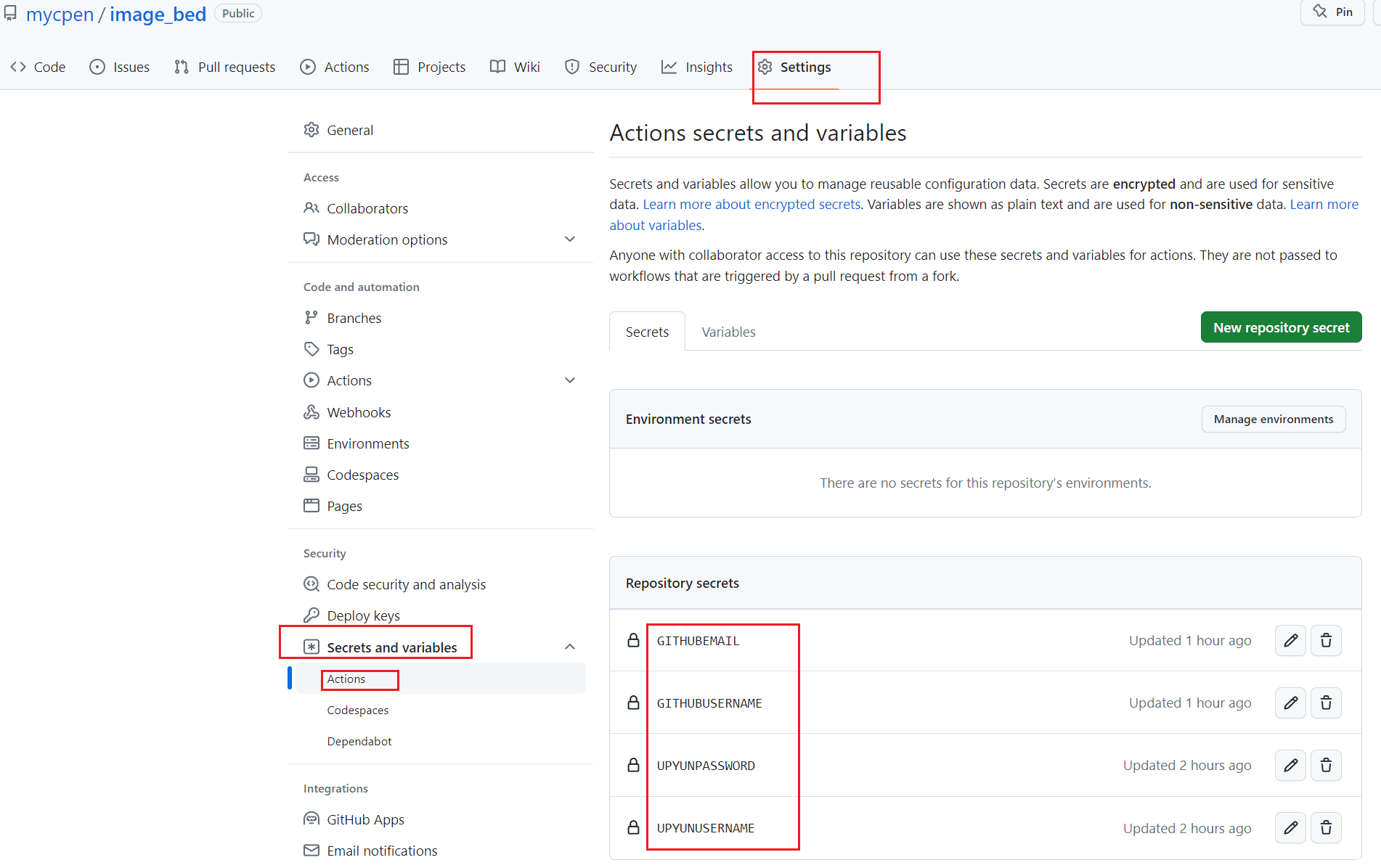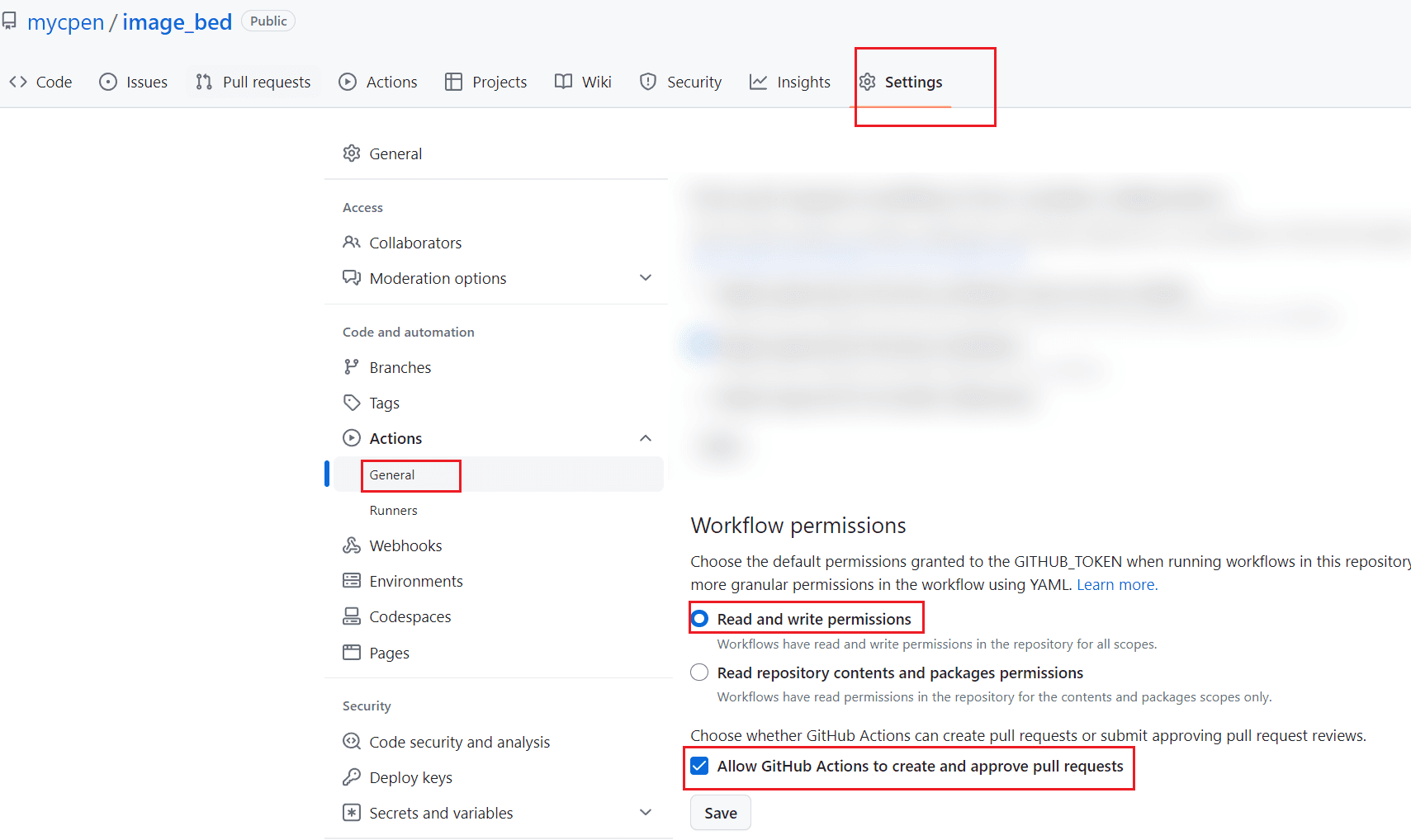Introduction#
Using GitHub Actions to run Python FTP scripts on a schedule to achieve backups between Upyun Cloud Storage and GitHub repositories.
Repository example: https://github.com/mycpen/image_bed/tree/main/.github
Personal Example#
1. Add Workflow YML File#
Copy my YML example below; or follow this article, choose your desired workflow template, and then customize the content (Actions => New workflow = Choose a workflow).
My file path is .github/workflows/python-app.yml, and the content is as follows:
# This workflow will install Python dependencies, run tests and lint with a single version of Python
# For more information see: https://docs.github.com/en/actions/automating-builds-and-tests/building-and-testing-python
name: Python application
on:
schedule:
- cron: "0 17 * * 5" # Saturday 1:00 AM
workflow_dispatch:
jobs:
build:
runs-on: ubuntu-latest
steps:
- uses: actions/checkout@v3
- uses: szenius/set-timezone@v1.0 # Set the timezone of the execution environment
with:
timezoneLinux: "Asia/Shanghai"
- name: Set up Python 3.10
uses: actions/setup-python@v3
with:
python-version: "3.10"
- name: Run sync script
env:
UPYUNUSERNAME: ${{ secrets.UPYUNUSERNAME }}
UPYUNPASSWORD: ${{ secrets.UPYUNPASSWORD }}
run: |
git config --global user.name ${{ secrets.GITHUBUSERNAME }}
git config --global user.email ${{ secrets.GITHUBEMAIL }}
python .github/ftp.py
bash git.sh
Parameter explanation:
-
cron: Defines the schedule for the workflow (with a delay), in Greenwich Mean Time (UTC). To convert to Beijing time, add 8 hours. Refer to: Cron format and settings in Actions, Handling timezone and caching issues in Actions -
UPYUNUSERNAME,UPYUNPASSWORD,GITHUBUSERNAME,GITHUBEMAILare custom Secrets constants.Constant Name Explanation UPYUNUSERNAME Upyun FTP username, format "Operator Name/Service Name", refer to Upyun Video Tutorial, Upyun Documentation UPYUNPASSWORD Upyun FTP password, refer to the above GITHUBUSERNAME GitHub account, e.g., mycpen GITHUBEMAIL Main email associated with the GitHub account -
ftp.py: Python script that synchronizes the file contents of the cloud storage and the repository using FTP. -
git.sh: A script that pushes local changes to the remote, including commands like git add, git commit, git push.
2. Add Secrets Constants#
Add 4 Secrets constants: UPYUNUSERNAME, UPYUNPASSWORD, GITHUBUSERNAME, GITHUBEMAIL, with the same meanings as above.

3. Grant Workflow Read and Write Permissions#
Refer to: https://blog.csdn.net/jj89929665/article/details/129817011

4. Create Python Sync Script#
The script content is from: Python FTP Upload and Download Functionality.
The if statement at the end of the script declares the relevant paths and parameters.
My script path is .github/ftp.py, which synchronizes the repository's image/ directory with the Upyun cloud storage /image/ directory, and the content is as follows:
#!/usr/bin/python
# -*- coding: UTF-8 -*-
from cmath import log
from ftplib import FTP
import os
import sys
import time
import socket
import subprocess
class MyFTP:
"""
FTP automatic download and upload script, can operate recursively on directories
Author: Ouyang Peng
Blog address: http://blog.csdn.net/ouyang_peng/article/details/79271113
"""
def __init__(self, host, port=21):
""" Initialize FTP client
Parameters:
host: IP address
port: Port number
"""
# print("__init__()---> host = %s ,port = %s" % (host, port))
self.host = host
self.port = port
self.ftp = FTP()
# Reset encoding method
#self.ftp.encoding = 'gbk'
self.ftp.encoding = 'utf8'
# Get script path
path = os.path.dirname(os.path.realpath(__file__))
# self.log_file = open(path + "/log.txt", "a", encoding='utf-8')
self.file_list = []
def login(self, username, password):
""" Initialize FTP client
Parameters:
username: Username
password: Password
"""
try:
timeout = 60
socket.setdefaulttimeout(timeout)
# 0 active mode 1 passive mode
self.ftp.set_pasv(True)
# Open debug level 2 to show detailed information
# self.ftp.set_debuglevel(2)
self.debug_print('Starting to connect to %s' % self.host)
self.ftp.connect(self.host, self.port)
self.debug_print('Successfully connected to %s' % self.host)
self.debug_print('Starting to log in to %s' % self.host)
self.ftp.login(username, password)
self.debug_print('Successfully logged in to %s' % self.host)
self.debug_print(self.ftp.welcome)
except Exception as err:
self.deal_error("FTP connection or login failed, error description: %s" % err)
pass
def is_same_size(self, local_file, remote_file):
""" Check if the sizes of the remote file and local file are the same
Parameters:
local_file: Local file
remote_file: Remote file
"""
try:
remote_file_size = self.ftp.size(remote_file)
except Exception as err:
# self.debug_print("is_same_size() error description: %s" % err)
remote_file_size = -1
try:
local_file_size = os.path.getsize(local_file)
except Exception as err:
# self.debug_print("is_same_size() error description: %s" % err)
local_file_size = -1
self.debug_print('local_file_size:%d , remote_file_size:%d' % (local_file_size, remote_file_size))
if remote_file_size == local_file_size:
return 1
else:
return 0
def download_file(self, local_file, remote_file):
""" Download file from FTP
Parameters:
local_file: Local file
remote_file: Remote file
"""
self.debug_print("download_file()---> local_path = %s ,remote_path = %s" % (local_file, remote_file))
if self.is_same_size(local_file, remote_file):
self.debug_print('%s file sizes are the same, no need to download' % local_file)
return
else:
try:
self.debug_print('>>>>>>>>>>>> Downloading file %s ... ...' % local_file)
buf_size = 1024
file_handler = open(local_file, 'wb')
self.ftp.retrbinary('RETR %s' % remote_file, file_handler.write, buf_size)
file_handler.close()
except Exception as err:
self.debug_print('Error downloading file, exception: %s ' % err)
return
def download_file_tree(self, local_path, remote_path):
""" Download multiple files from a remote directory to a local directory
Parameters:
local_path: Local path
remote_path: Remote path
"""
print("download_file_tree()---> local_path = %s ,remote_path = %s" % (local_path, remote_path))
try:
self.ftp.cwd(remote_path)
except Exception as err:
self.debug_print('Remote directory %s does not exist, continuing...' % remote_path + " ,specific error description: %s" % err)
return
if not os.path.isdir(local_path):
self.debug_print('Local directory %s does not exist, creating local directory' % local_path)
os.makedirs(local_path)
self.debug_print('Switched to directory: %s' % self.ftp.pwd())
self.file_list = []
# Method callback
self.ftp.dir(self.get_file_list)
remote_names = self.file_list
self.debug_print('Remote directory list: %s' % remote_names)
for item in remote_names:
file_type = item[0]
file_name = item[1]
local = os.path.join(local_path, file_name)
if file_type == 'd':
print("download_file_tree()---> Downloading directory: %s" % file_name)
self.download_file_tree(local, file_name)
elif file_type == '-':
print("download_file()---> Downloading file: %s" % file_name)
self.download_file(local, file_name)
self.ftp.cwd("..")
self.debug_print('Returned to upper directory %s' % self.ftp.pwd())
return True
def upload_file(self, local_file, remote_file):
""" Upload file from local to FTP
Parameters:
local_path: Local file
remote_path: Remote file
"""
if not os.path.isfile(local_file):
self.debug_print('%s does not exist' % local_file)
return
if self.is_same_size(local_file, remote_file):
self.debug_print('Skipping equal file: %s' % local_file)
return
buf_size = 1024
file_handler = open(local_file, 'rb')
self.ftp.storbinary('STOR %s' % remote_file, file_handler, buf_size)
file_handler.close()
self.debug_print('Uploaded: %s' % local_file + " successfully!")
def upload_file_tree(self, local_path, remote_path):
""" Upload multiple files from a local directory to FTP
Parameters:
local_path: Local path
remote_path: Remote path
"""
if not os.path.isdir(local_path):
self.debug_print('Local directory %s does not exist' % local_path)
return
self.ftp.cwd(remote_path)
self.debug_print('Switched to remote directory: %s' % self.ftp.pwd())
local_name_list = os.listdir(local_path)
for local_name in local_name_list:
src = os.path.join(local_path, local_name)
if os.path.isdir(src):
try:
self.ftp.mkd(local_name)
except Exception as err:
self.debug_print("Directory already exists %s ,specific error description: %s" % (local_name, err))
self.debug_print("upload_file_tree()---> Uploading directory: %s" % local_name)
self.upload_file_tree(src, local_name)
else:
self.debug_print("upload_file_tree()---> Uploading file: %s" % local_name)
self.upload_file(src, local_name)
self.ftp.cwd("..")
def close(self):
""" Exit FTP
"""
self.debug_print("close()---> Exiting FTP")
self.ftp.quit()
# self.log_file.close()
def debug_print(self, s):
""" Print log
"""
self.write_log(s)
def deal_error(self, e):
""" Handle error exceptions
Parameters:
e: Exception
"""
log_str = 'An error occurred: %s' % e
self.write_log(log_str)
sys.exit()
def write_log(self, log_str):
""" Record log
Parameters:
log_str: Log
"""
time_now = time.localtime()
date_now = time.strftime('%Y-%m-%d', time_now)
format_log_str = "%s ---> %s \n " % (date_now, log_str)
print(format_log_str)
# self.log_file.write(format_log_str)
def get_file_list(self, line):
""" Get file list
Parameters:
line:
"""
file_arr = self.get_file_name(line)
# Remove . and ..
if file_arr[1] not in ['.', '..']:
self.file_list.append(file_arr)
def get_file_name(self, line):
""" Get file name
Parameters:
line:
"""
pos = line.rfind(':')
while (line[pos] != ' '):
pos += 1
while (line[pos] == ' '):
pos += 1
file_arr = [line[0], line[pos:]]
return file_arr
if __name__ == "__main__":
# Clear logs
path = os.path.dirname(os.path.realpath(__file__)) # Script path
# if os.path.exists(path + '/log.txt'):
# log_file = path + '/log.txt 'if os.sep == "/" else path + '\\' + 'log.txt'
# subprocess.Popen(f'rm -rf {log_file}', shell=True)
# time.sleep(1)
# Get Actions Secrets constants
upyunUsername = os.environ["UPYUNUSERNAME"]
upyunPassword = os.environ["UPYUNPASSWORD"]
my_ftp = MyFTP("v0.ftp.upyun.com")
my_ftp.login(upyunUsername, upyunPassword)
# Download directory
# Upyun cloud storage → Local image/
if os.sep == "\\": # Windows
pass
elif os.sep == "/": # Unix
my_ftp.download_file_tree("image/", "/image/") # image/ repository directory; /image/ Upyun cloud storage directory
# Upload directory
# Local image/ → Upyun cloud storage
if os.sep == "\\":
pass
elif os.sep == "/":
my_ftp.upload_file_tree("image/", "/image/") # image/ repository directory; /image/ Upyun cloud storage directory
my_ftp.close()
5. git.sh Push Changes#
I personally prefer to write the push command in a file and place it in the root directory of the repository.
#!/usr/bin/bash
# Sync remote to local
git pull
# Push changes
git add .
git commit -m "$(date +'%Y/%m/%d')"
git push
Reference Articles#
- * Python script to get repository secrets in GitHub Actions
- * Create scheduled tasks using GitHub repositories for regular sign-ins and other services
- * FTP upload and download functionality implemented in Python
- * Fully automated deployment using GitHub Action
- * Upyun: How to upload files using FTP and API
- * Upyun: Create storage service and upload using FTP
- * Cron format and settings in GitHub/Gitlab Actions
- * Running Python scheduled tasks in GitHub Actions (handling timezone and caching issues)
- * Unable to access ‘https://github.com/x/‘: The requested URL returned error: 403 when running GitHub Actions
- * workflow_dispatch
- Using GitHub Actions for scheduled tasks
- Automatically pushing changes with GitHub+Action
- Automated packaging and deployment based on GitHub Action services
- Scheduled tasks based on GITHUB ACTION, truly fragrant!
- Scheduled execution of code in GitHub Actions: Daily scheduled Baidu link push